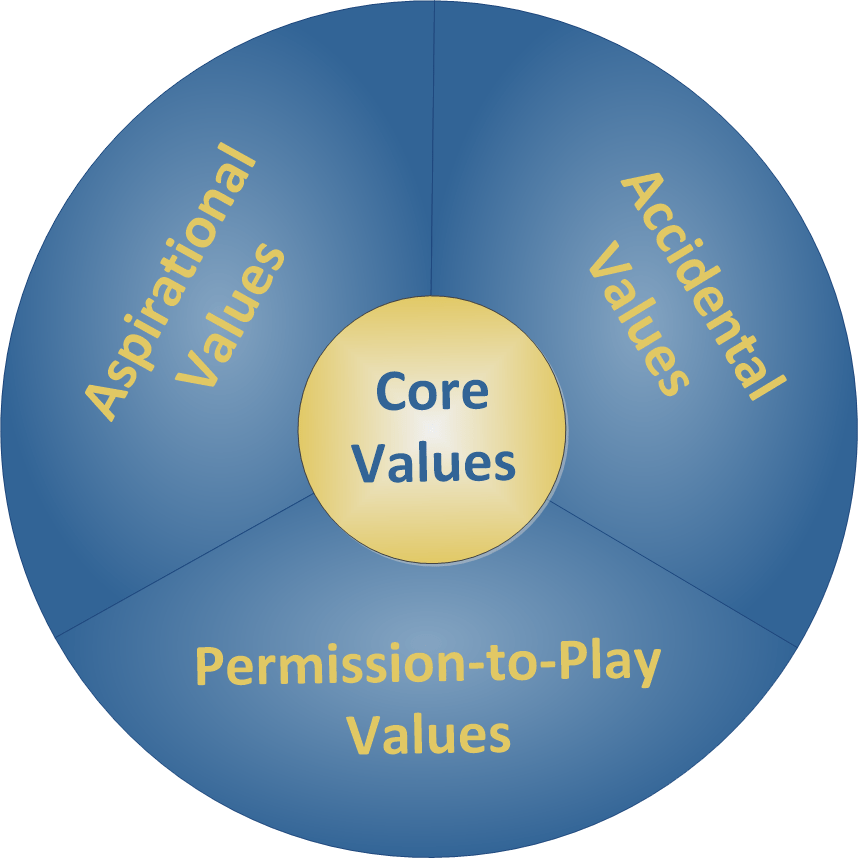In Values (pt. 1), I explored WHAT role your values play in pursuing an interesting, fulfilling, and meaningful life. Additionally, I began discussing HOW values become actualized in practice.
In this post, I will draw upon some additional models and perspectives on value oriented behavior to provide more depth for how you can think about values as a performance and life enhancer.
Patrick Lencioni, author of The Advantage: Why Organizational Health Trumps Everything Else in Business, describes six critical questions all senior leadership teams of organizations have to answer in order to create clarity for the entire organization:
- Why do we exist?
- HOW DO WE BEHAVE?
- What do we do?
- How will we succeed?
- What is most important, right now?
- Who must do what?
“The answer to the question, ‘How do we behave?” is embedded in an organization’s core values, which should provide the ultimate guide for employee behavior at all levels…The importance of values in creating clarity and enabling a company to become healthy cannot be overstated. More than anything else, values are critical because they define a company’s personality.”
Patrick Lencioni, p. 91
Values are about behavior, and when combined with a deliberate and conscious WHY statement, they create a metaphorical fingerprint of an individual, team, or organization’s identity. All historical figures that are considered models of ambition, fortitude, and service are celebrated because they stood for something. They refused to accept the status quo when their values pointed them toward being an ambassador for a better way forward. This makes them virtuous.
“Confucius said that virtue is a kind of polestar. It not only provides guidance to the navigator, but it attracts fellow travelers too.”
Ryan Holiday , p. 101
“What is virtue? Seneca would ask. His answer: ‘True and steadfast judgment.’ And from virtue comes good decisions and happiness and peace. It emanates from the soul and directs the mind and the body.”
Ryan Holiday, p. 102
Being virtuous requires distinguishing between different kinds of values.

- Core Values: As the name suggests, these are the values that are CORE to your being. They resonate and speak to you BECAUSE of something deep inside of you based on your experiences and unique worldview. These are the values that are naturally a part of who you are and how you behave when you are at your best and in alignment with your WHY. These values should transcend all contexts of your life.
- Aspirational Values: Many organizations make the mistake of deciding upon core values that are, in fact, actually aspirational because they are expressing how they would like and intend to behave. Aspirational values are important and serve the objective of continually evolving an individual’s or group’s capabilities to become more adaptable. However, not deliberately distinguishing between core and aspirational values creates ambiguity for yourself and for whom you seek to serve.
- Permission-to-Play Values: These are the minimum behavioral standards. In many cases, these values are less about principle and more akin to being at the level of consensus and consequence (described in pt. 1). These values serve societal bare minimums of being respectful and being obedient to laws, rules, and regulations.
- Accidental Values: These are the types of values that create the antithesis of virtuous behavior. They become values only by way of habit. They are the consequence of behaving out of fear, avoidance, and convenience, as opposed to a virtuous standard of excellence.
“Your beliefs become your thoughts,
Mahatma Ghandi
Your thoughts become your words,
Your words become your actions,
Your actions become your habits,
Your habits become your values,
Your values become your destiny.”
You have core values. This I am sure of. Your opportunity is to formally distill and articulate your three to five core values in such a prescriptive way that you create your own standard of excellence that you can measure and evaluate your behavior against. More on this in pt. 3…




